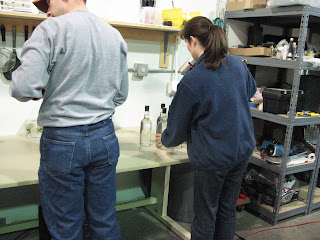Because my husband and I enjoyed our tour of the Kentucky Bourbon Trail so much, I decided to look for similar experiences closer to home. I'm familiar with and have toured some local wineries and breweries, and readers of the blog will recall we visited the Wasmund's distillery last year, but the microdistillery scene is growing.
Enter Catoctin Creek Distillery.
Located in a garage in an industrial park in the middle of Loudoun County Virginia, which is pretty much the middle of nowhere, Catoctin Creek is a tiny family-owned distillery making rye, gin, unaged/white whiskey, and a couple of brandies.
Owners Scott and Becky Harris are totally committed to a 100% organic operation. Everything - from the ingredients, the equipment, the cleaning solutions are certified organic. Even the barrels are made from certified organic Minnesota oak including the sealants on the barrels which are beeswax.
Every so often they recruit no more than 20 volunteers to help them bottle the next batch. The husband and I were lucky enough to get a couple of slots and join them for bottling day this weekend. It was a fun learning experience that made us continue the fantasy of becoming distillers ourselves.
All batches have multiple types of alcohol resulting from the distillation process. The poorer tasting alcohols come of the distillate first (the heads) and then again at the end (the tails). The art in distilling comes in taking the proper cut of the "heart" of the distillate (avoiding the heads and tails), where you get pure, clean-tasting ethanol alcohol.
All the spirits except for the pear and grape brandies are made from 100% organic rye flour.
It is used to create a mash that is heated and then cooled in a large, blue fermentation tank for 3 to 5 days.
The fermented rye is then distilled in a German copper still, heated by electricity.
Distilled rye spirit is run off and the heart is poured into stainless steel casks to hold Mosby's Rye Spirit and Waterhead Gin. Another batch is aged for less than 2 years in charred oak barrels for Roundstone Rye Whiskey.
Now they call in the volunteer troops...
Once they are ready to bottle, the distillate goes into what they call the whiskey cow, known in other circles as the bottle filler. Check out the future whiskey-drinker...
A volunteer corks the bottle and checks for foreign particles. The bottles are then sealed.
Next, the bottles are labeled both front and back.
Finally, the bottles are boxed and the boxes are sealed, labeled, and stacked.




















No comments:
Post a Comment